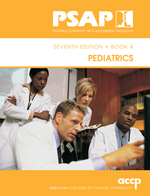
The special health care needs of children are the focus of the fourth book in the Pharmacotherapy Self-Assessment Program, seventh edition (PSAP-VII). Pediatrics provides evidence-based information on a variety of topics pertaining to the care of neonates, infants, and children in various care settings.
Pediatrics has three learning modules offering a total of 16.0 continuing pharmacy education credits. The first module begins with a review of the current knowledge related to pharmacogenomics and pharmacotherapy in children and includes chapters on managing children with sickle cell disease and those who have been poisoned. The second module examines legislation and regulations concerning pharmacotherapy in children, the use of extemporaneous preparations, appropriate management of children with gastroesophageal reflux disease, and optimal use of parenteral nutrition in neonates. Chapters in the third module review hypoglycemia and pulmonary arterial hypertension in the critically ill child, postoperative care after repair of congenital heart disease, and kidney disease in children.
Each PSAP chapter has an extensive annotated bibliography that identifies key research articles, clinical practice guidelines, texts, and Web sites relevant to today’s practicing clinical pharmacist. The Pediatrics book is designed to assist pharmacists who want to:
- Apply basic pharmacogenomic principles to design a patient-specific treatment plan.
- Devise an individualized pharmacy care plan for a child with sickle cell disease and its various complications.
- Develop a management plan for a child who has ingested a variety of toxic substances or been bitten by a snake.
- Apply knowledge of legislation and regulation governing conduct of research in children to the development or analysis of research protocols conducted in children.
- Assess the availability and appropriateness of various extemporaneous formulations used in children.
- Develop and/or modify a care plan to provide optimal nutrition for a neonate requiring parenteral nutrition.
- Develop treatment and monitoring plans for a critically ill child with hyperglycemia.
- Devise an individualized pharmacy care plan for a child with pulmonary artery hypertension.
- Develop a care plan for a child with nephrotic syndrome or other types of chronic kidney disease.
Pediatrics will be released October 15. All PSAP books are available in both print and online formats. All PSAP-VII books feature an updated, reader-friendly design; a Baseline Resources Box with suggested background information on the chapter topic; and shorter chapters focusing on only the most recent updates.
The other books in the PSAP-VII series are Cardiology; Critical and Urgent Care; Women’s and Men’s Health; Chronic Illnesses; Oncology; Geriatrics; Science and Practice of Pharmacotherapy; Infectious Diseases; Neurology/Psychiatry; and Gastroenterology/Nutrition.
PSAP offers the most up-to-date and comprehensive information available on recent drug therapy advances. Each book will expand your knowledge in the therapeutic area covered. PSAP-VII is priced as follows (shipping and handling charges will apply to print books):
| |
Member Price |
Nonmember Price |
|
Single Books
|
| Print |
$75.00 |
$100.00 |
| Online |
$65.00 |
$90.00 |
| Print and online |
$105.00 |
$130.00 |
|
Full Series (11 books)
|
| Print |
$435.00 |
$635.00 |
| Online |
$385.00 |
$570.00 |
| Print and online |
$635.00 |
$820.00 |
For specific information on the release dates, continuing education credits, and Accreditation Council for Pharmacy Education (ACPE) program numbers for each book, visit www.accp.com/bookstore/psap7.aspx and place your order through the online bookstore.

The Board of Pharmacy Specialties (BPS) for use in Board Certified Pharmacotherapy Specialist (BCPS) recertification has approved prior editions of PSAP; similar approval is being sought for PSAP-VII. ACCP is accredited by ACPE as a provider of continuing pharmacy education.